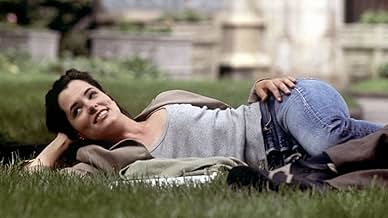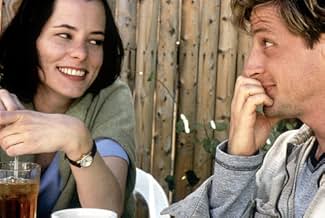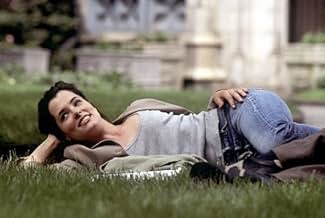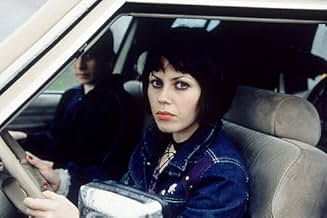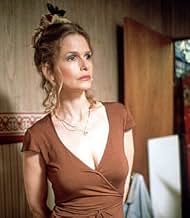Tres mujeres escapan de sus afligidas vidas. Cada uno lucha por huir de los hombres que confinan su libertad personal.Tres mujeres escapan de sus afligidas vidas. Cada uno lucha por huir de los hombres que confinan su libertad personal.Tres mujeres escapan de sus afligidas vidas. Cada uno lucha por huir de los hombres que confinan su libertad personal.
- Premios
- 6 premios ganados y 5 nominaciones en total
Joel de la Fuente
- Thavi Matola
- (as Joel De La Fuente)
Opiniones destacadas
I saw this film tonight at the First Annual Tribeca Film Festival and understood its success at Sundance. In short, this film is about the awakening of three different women in very different lives and circle around a news report of a shooting in Manhattan and an ensuing car accident. With the telling of each woman's tale, Miller uses a brilliant 'degree of relation' to the accident in order to develop an engaging and powerful film.
Delia casually watches the news report of the accident while waiting for the cook to bring up her next order in a small-town diner in upstate New York. Though the audience does not see a particularly unusual response that she has to it, we can imagine that her difficult circumstances allow her to relate to it on a level of shared human suffering.
Greta, who's story is told in a series of flashbacks, watches it on the morning news minutes before she has her epiphany about her failing marriage and the new turn that her life is taking as a prominent editor for a large Manhattan publishing house. Because it is the only scene in her story that takes place in the present time, the audience is left to wonder what sort of pivotal role the news report has played in her epiphany.
Finally, Paula's story brings the accident close to home as she is a witness to it. Her epiphany was a direct result of the accident since it was a near-death experience for her. She's not only shocked from the impact of it, but her struggle to explain it with cosmic signs allows her to transcend the accident and the events following it.
The performances were real, the direction was brilliant, and the common thread that ran through the intimate details of the women's awakenings flowed easily, despite the segmented telling of their tales. Miller's work in this film has inspired me to seek out her feature debut, _Angela_ as well.
Delia casually watches the news report of the accident while waiting for the cook to bring up her next order in a small-town diner in upstate New York. Though the audience does not see a particularly unusual response that she has to it, we can imagine that her difficult circumstances allow her to relate to it on a level of shared human suffering.
Greta, who's story is told in a series of flashbacks, watches it on the morning news minutes before she has her epiphany about her failing marriage and the new turn that her life is taking as a prominent editor for a large Manhattan publishing house. Because it is the only scene in her story that takes place in the present time, the audience is left to wonder what sort of pivotal role the news report has played in her epiphany.
Finally, Paula's story brings the accident close to home as she is a witness to it. Her epiphany was a direct result of the accident since it was a near-death experience for her. She's not only shocked from the impact of it, but her struggle to explain it with cosmic signs allows her to transcend the accident and the events following it.
The performances were real, the direction was brilliant, and the common thread that ran through the intimate details of the women's awakenings flowed easily, despite the segmented telling of their tales. Miller's work in this film has inspired me to seek out her feature debut, _Angela_ as well.
as you probably have heard, this is a movie that consists of three portraits. three very contrived, hard-to-watch portraits.
this movie charges out of the gate with incredible potential, including a great cast, an effective score, and nearly disorienting (yet, rather successful) camera work. additionally, at the start of the first portrait, the narrative freezes, and the narrator urges the viewer to, "wait!" so he can explain something about what's going on. this device is wonderful, and immediately gives the viewer a healthy shot of intrigue. additionally, at this point, you'll probably be really excited at the unorthodox pacing that the film seems to be setting up.
that's all in the first few minutes. and this movie literally screamed in a nosedive downward from there.
while "personal velocity" bucks conventions in many ways, it bucks the concept of storytelling so much that it is simply contrived. want to see development, plot, resolution? not here. this movie tries HARD to dodge all these things, and relentlessly starves the viewer of any of these elements with its spare dialogue.
but in the absence of these elements, what's left is - quite frankly - repetition. the characters simply keep doing what they did in the first moments of their portrait (or at least what the filmmakers set them up to do). and while they rather gratingly repeat their actions, there is no true character development.
to combat this (and surely the problem of converting short stories to film), the movie employs a narrator. this (and the repetition) is the downfall. first of all, who is the narrator? well, it's a male, which is strange since this is mainly a story about three women. ok, but why is he male? and why is he speaking so conversationally at some points? and why does he know of all these women? none of these questions are answered, and the viewer is forced to contend with this narrator who speaks incessantly throughout the entire film.
now this narrator suffers from an additional problem, which plagues the film: heavy-handedness. the narrator says things like, "she could feel the emotion like a vortex pulling her soul inward." that's actually not a direct quote, but it's very close. i am not exaggerating. at one point a character says, "you look you're waiting for something." and the narrator breaks in, "she was, she always has been." this movie can't afford such lead-weighted narration. and it certainly does not fall in line with the narrator's other parts where he's talking about how great kyra sedgewick's ass looks in jeans.
in the end, you've got however many minutes (i don't know 90ish?) of superb acting and inventive cinematography. but anchoring it down without an inch of slack to go anywhere is an overbearing narrator, and three equally overbearing and repetitious movements of what could have probably been a compelling film.
this movie charges out of the gate with incredible potential, including a great cast, an effective score, and nearly disorienting (yet, rather successful) camera work. additionally, at the start of the first portrait, the narrative freezes, and the narrator urges the viewer to, "wait!" so he can explain something about what's going on. this device is wonderful, and immediately gives the viewer a healthy shot of intrigue. additionally, at this point, you'll probably be really excited at the unorthodox pacing that the film seems to be setting up.
that's all in the first few minutes. and this movie literally screamed in a nosedive downward from there.
while "personal velocity" bucks conventions in many ways, it bucks the concept of storytelling so much that it is simply contrived. want to see development, plot, resolution? not here. this movie tries HARD to dodge all these things, and relentlessly starves the viewer of any of these elements with its spare dialogue.
but in the absence of these elements, what's left is - quite frankly - repetition. the characters simply keep doing what they did in the first moments of their portrait (or at least what the filmmakers set them up to do). and while they rather gratingly repeat their actions, there is no true character development.
to combat this (and surely the problem of converting short stories to film), the movie employs a narrator. this (and the repetition) is the downfall. first of all, who is the narrator? well, it's a male, which is strange since this is mainly a story about three women. ok, but why is he male? and why is he speaking so conversationally at some points? and why does he know of all these women? none of these questions are answered, and the viewer is forced to contend with this narrator who speaks incessantly throughout the entire film.
now this narrator suffers from an additional problem, which plagues the film: heavy-handedness. the narrator says things like, "she could feel the emotion like a vortex pulling her soul inward." that's actually not a direct quote, but it's very close. i am not exaggerating. at one point a character says, "you look you're waiting for something." and the narrator breaks in, "she was, she always has been." this movie can't afford such lead-weighted narration. and it certainly does not fall in line with the narrator's other parts where he's talking about how great kyra sedgewick's ass looks in jeans.
in the end, you've got however many minutes (i don't know 90ish?) of superb acting and inventive cinematography. but anchoring it down without an inch of slack to go anywhere is an overbearing narrator, and three equally overbearing and repetitious movements of what could have probably been a compelling film.
This film, directed and written by Rebecca Miller, is a very satisfying experience for a new director who, here, is adapting her own material with a lot of relish and savoir-faire. There's a certain elegance in the way she treats her characters, always respectful, yet incisive. The only complain we could raise is the fact that each story is very short, so when we are still savoring each one, individually, Ms Miller, for reasons of timing, pulls them from under us.
The first story, Delia, shows a woman's worst fears in being married to a wife beater of the worst kind. She might have had dreams of making a happy home for her family, but her man has another thing in mind. This woman is a step above white trash. She tries hard to get herself together but everything keeps interfering with her independence. Played with gusto by Kyra Sedwick, Delia ends up as a waitress in order to support herself and the children. Her encounter with the bully from the restaurant is an exercise in how low they want her to go, but she comes out a winner.
The second story, Greta, is the best of the three. With the help of the great Parker Posey, this Greta comes out as the tough woman she wants everyone to think of her, but deep down, inside her, she's a vulnerable and frightened and unfulfilled over achiever. Ms Posey has never shown so many nuances in a performance that is so economic in the terms that are dictated by the length of the story. We get to know more about her than the narrator ever tells us. Every expression on this actress face is true. It's surprising what has been achieved here with the collaboration of the director and the player.
The last story, Paula, is the weakest. It's all about a very confused young woman who's out on the road to see her parents. She has very deep problems. Along the way she picks up a hitchhiker who stays with her through the trip. Paula is in a voyage of discovering, but little does she know that what she needs is what she has left at home: her Haitian man, who obviously cares a lot about her. As played by Fairuza Balk, she shows the turmoil in her head that only she can resolve.
We hope Miss Miller's next time out will be very soon because she's got a feel for getting inside her characters and finding angles they didn't even suspect of having.
The first story, Delia, shows a woman's worst fears in being married to a wife beater of the worst kind. She might have had dreams of making a happy home for her family, but her man has another thing in mind. This woman is a step above white trash. She tries hard to get herself together but everything keeps interfering with her independence. Played with gusto by Kyra Sedwick, Delia ends up as a waitress in order to support herself and the children. Her encounter with the bully from the restaurant is an exercise in how low they want her to go, but she comes out a winner.
The second story, Greta, is the best of the three. With the help of the great Parker Posey, this Greta comes out as the tough woman she wants everyone to think of her, but deep down, inside her, she's a vulnerable and frightened and unfulfilled over achiever. Ms Posey has never shown so many nuances in a performance that is so economic in the terms that are dictated by the length of the story. We get to know more about her than the narrator ever tells us. Every expression on this actress face is true. It's surprising what has been achieved here with the collaboration of the director and the player.
The last story, Paula, is the weakest. It's all about a very confused young woman who's out on the road to see her parents. She has very deep problems. Along the way she picks up a hitchhiker who stays with her through the trip. Paula is in a voyage of discovering, but little does she know that what she needs is what she has left at home: her Haitian man, who obviously cares a lot about her. As played by Fairuza Balk, she shows the turmoil in her head that only she can resolve.
We hope Miss Miller's next time out will be very soon because she's got a feel for getting inside her characters and finding angles they didn't even suspect of having.
Writer and director Rebecca Miller(daughter of legendary playwright Arthur) patches together three stories of three different women for this film and the movie itself is quite an intriguing curiosity for it.
Delia(Kyra Sedgwick,familiar yet still distinctive here)is an abused housewife and mother who's only known really one thing about herself-her sexuality-and has to find a way out of her sad,low-esteemed predicament,while wondering if she should use her sexuality or not; Greta(Parker Posey,for whom the type of roles she could inhabit are practically limitless) is a career-driven woman whose marriage is peaceful but uninspiring; and Paula(Fairuza Balk,whose angry eyes and wild visage is an ironic contrast to the scared character she's playing),has escaped a horrifying accident and now aids a runaway teen,all the while mindful of the fact that she's just learned she's pregnant.
I must say I was quite pleased with elements of the movie:the narration,the anthology of it and,of course,the actors,who all are very fine here. But I suppose what left me dry here was the way these stories played out. I will not go into any detail so as to inadvertently throw out spoilers,but it to me felt like these stories were resolved in ways that seemed only evident to the writer herself. I read one reviewer describe these tales as sorts of "Women's lib" stories,and that may be true,and not being a woman myself and certainly not a feminist,I suppose if these endings seemed lost on me,well,that's my problem I suppose.
Not a movie for those who absolutely NEED their films to have a sort of set,rising-plot/climax/denouement model in order to digest their usage of 90 min to 2 hours of time,but I suspect that the film's creator doesn't really care about that. She set out to portray three ordinary yet intriguing characters and,for the most part,I feel like she succeeded.
Delia(Kyra Sedgwick,familiar yet still distinctive here)is an abused housewife and mother who's only known really one thing about herself-her sexuality-and has to find a way out of her sad,low-esteemed predicament,while wondering if she should use her sexuality or not; Greta(Parker Posey,for whom the type of roles she could inhabit are practically limitless) is a career-driven woman whose marriage is peaceful but uninspiring; and Paula(Fairuza Balk,whose angry eyes and wild visage is an ironic contrast to the scared character she's playing),has escaped a horrifying accident and now aids a runaway teen,all the while mindful of the fact that she's just learned she's pregnant.
I must say I was quite pleased with elements of the movie:the narration,the anthology of it and,of course,the actors,who all are very fine here. But I suppose what left me dry here was the way these stories played out. I will not go into any detail so as to inadvertently throw out spoilers,but it to me felt like these stories were resolved in ways that seemed only evident to the writer herself. I read one reviewer describe these tales as sorts of "Women's lib" stories,and that may be true,and not being a woman myself and certainly not a feminist,I suppose if these endings seemed lost on me,well,that's my problem I suppose.
Not a movie for those who absolutely NEED their films to have a sort of set,rising-plot/climax/denouement model in order to digest their usage of 90 min to 2 hours of time,but I suspect that the film's creator doesn't really care about that. She set out to portray three ordinary yet intriguing characters and,for the most part,I feel like she succeeded.
I am hard-pressed to explain the praise heaped on this movie, and must sadly choose the obvious. This film would never have been touted as it has if it were made by someone other than Arthur Miller's daughter/Daniel Day Lewis's wife.
Of the film's three vignettes--domestic violence survivor, conflicted editor, and confused runaway--the second is most telling. Greta, the failure to her family, craves success and power in the literary world and only needs to have her innate talents recognized to do so. Her skill is "trimming the fat" from others' writing. However, Ms. Miller seems to have had no such attention paid to her own work. The incessant and intrusive voiceover dialogue, I assume taken directly from her collection of short stories, features pseudo-deep lines that made me literally laugh out loud.
In addition, I found many of the camera tricks and plot devices amateurish and the characters shallow and essentialized. I cannot recommend this film, which basks in its own specialness and its claims to gritty reality. Ms. Miller is a tourist in the lives of the struggling women she attempts to portray.
Of the film's three vignettes--domestic violence survivor, conflicted editor, and confused runaway--the second is most telling. Greta, the failure to her family, craves success and power in the literary world and only needs to have her innate talents recognized to do so. Her skill is "trimming the fat" from others' writing. However, Ms. Miller seems to have had no such attention paid to her own work. The incessant and intrusive voiceover dialogue, I assume taken directly from her collection of short stories, features pseudo-deep lines that made me literally laugh out loud.
In addition, I found many of the camera tricks and plot devices amateurish and the characters shallow and essentialized. I cannot recommend this film, which basks in its own specialness and its claims to gritty reality. Ms. Miller is a tourist in the lives of the struggling women she attempts to portray.
¿Sabías que…?
- TriviaMaria Elena Ramirez's debut.
- Citas
Greta Herskowitz: How could he still love me? If he does, it's because he doesn't know me. I'm rotten with ambition, a lusty little troll, the kind of demon you'd find at the bottom floor of hell pulling fingernails off the loansharks.
- Créditos curiososTo my mother
- ConexionesFeatured in Personal Velocity: Creating 'Personal Velocity' (2003)
Selecciones populares
Inicia sesión para calificar y agrega a la lista de videos para obtener recomendaciones personalizadas
- How long is Personal Velocity?Con tecnología de Alexa
Detalles
Taquilla
- Presupuesto
- USD 125,000 (estimado)
- Total en EE. UU. y Canadá
- USD 811,299
- Fin de semana de estreno en EE. UU. y Canadá
- USD 29,943
- 24 nov 2002
- Total a nivel mundial
- USD 890,502
- Tiempo de ejecución1 hora 26 minutos
- Color
- Mezcla de sonido
- Relación de aspecto
- 1.85 : 1
Contribuir a esta página
Sugiere una edición o agrega el contenido que falta


